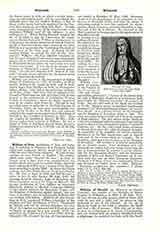

William of Vercelli (or WILLIAM OF MONTE VERGINE), the founder of the Hermits of Monte Vergine, or Williamites, b. 1085; d. June 25, 1142. He was the son of noble parents, both of whom died while he was still a child, and his education was entrusted to one of his kinsmen. At the age of fifteen he made up his mind to renounce the world and lead a life of penance. With this end in view, he went on a pilgrimage to St. James of Compostella, and, not content with the ordinary hardships of such a pilgrimage, he encircled his body with iron bands to increase his suffering. After this journey he started on a pilgrimage to the Holy Land, but it was revealed to him that he would be of greater service to God if he remained in Italy. He built himself a hut on Monte Vergine, wishing to become a hermit and live in solitude, but it was not long before many people flocked to him to put themselves under his guidance, being attracted by the sanctity of his life and the many miracles which he performed. Soon a monastery was built, and by 1119 the Congregation of Monte Vergine (q.v.) was founded. St. William lived at Monte Vergine until the brethren began to murmur against him, saying that the life was too austere, that he gave too much in alms, and so on. He therefore decided to leave Monte Vergine and thus take away from the monks the cause of their grievances. Roger I of Naples took him under his patronage, and the saint founded many monasteries, both of men and of women in that kingdom. So edified was the king with the saint’s sanctity of life and the wisdom of his counsels that, in order to have him always near him, he built a monastery opposite his palace at Salerno. Knowing by special revelation that his end was at hand, William retired to his monastery of Guglieto, where he died, and was buried in the church.
PAUL BROOKFIELD

